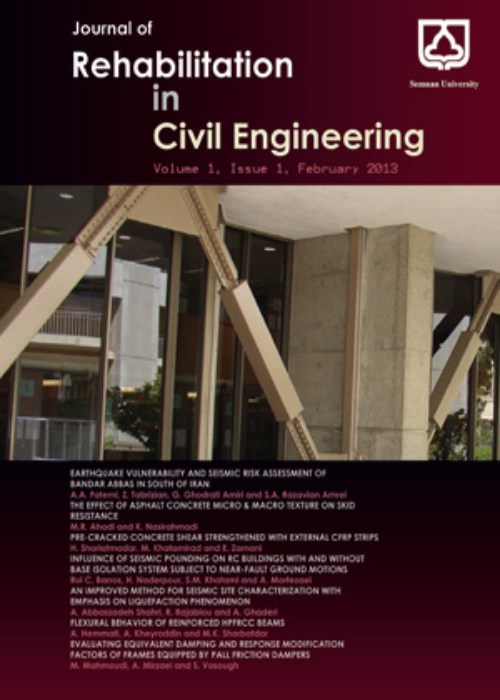Bond Strength of Fiber-Reinforced Mortar and Concrete Interface under Pre-Stress
Author(s):
Article Type:
Research/Original Article (دارای رتبه معتبر)
Abstract:
Shrinkage and improper compaction of the repair layer are among the main reasons for the adhesion drop. Shrinkage results in cracking and improper compaction causes fine pores in the interface. Due to the fact that shrinkage and non-compacting are the main reasons for reducing strength and adhesion, therefore, in this paper, research has been done in this regard. The present study aimed to investigate the effect of polypropylene fibers on the shrinkage of mortars and bond of mortar/concrete interface. Moreover, the impact of diverse pre-stresses on the adhesion between mortar and concrete was evaluated by imposing pre-stresses on fiber-reinforced mortars. Adhesion was assessed by the “twist-off” and “pull-off” tests. Furthermore, the effect of fibers and pre-stress on the adhesion examined using SEM images and X-ray diffraction. It is necessary to assess the compressive strength of concrete and mortar in the field. Therefore, the aforementioned semi-destructive methods were employed to investigate the in-situ compressive strength of mortars at different ages. For this purpose, the correlation coefficient between the in-situ and laboratory methods was defined and the scaling curves were plotted to convert the in-situ test results into compressive strengths of the mortars. The obtained findings indicated the positive effect of pre-stress on adhesion. In addition to their mechanical effect, the indirect effect of fibers on the chemical properties of the mortars reduces shrinkage and augments adhesion. Moreover, given the great relationship among the conclusion of “pull-off” and “twist-off” methods, the cost-efficient and available twist-off apparatus can be used for adhesion measurement instead of the costly and import pull-off apparatus. Adding 0.3% of polypropylene fibers to the mortars enhanced the bond strength by 76.8% and 41.7%, respectively and reduced the shrinkage of the mortars by 11%. An initial stress of 0.5 kg/cm2 increased the shear and tensile bond strength at the age of 90 days by 12.8% and 13.3%, respectively.
Language:
English
Published:
Journal of Rehabilitation in Civil Engineering, Volume:11 Issue: 2, Spring 2023
Pages:
113 to 130
https://magiran.com/p2614068
دانلود و مطالعه متن این مقاله با یکی از روشهای زیر امکان پذیر است:
اشتراک شخصی
با عضویت و پرداخت آنلاین حق اشتراک یکساله به مبلغ 1,390,000ريال میتوانید 70 عنوان مطلب دانلود کنید!
اشتراک سازمانی
به کتابخانه دانشگاه یا محل کار خود پیشنهاد کنید تا اشتراک سازمانی این پایگاه را برای دسترسی نامحدود همه کاربران به متن مطالب تهیه نمایند!
توجه!
- حق عضویت دریافتی صرف حمایت از نشریات عضو و نگهداری، تکمیل و توسعه مگیران میشود.
- پرداخت حق اشتراک و دانلود مقالات اجازه بازنشر آن در سایر رسانههای چاپی و دیجیتال را به کاربر نمیدهد.
In order to view content subscription is required
Personal subscription
Subscribe magiran.com for 70 € euros via PayPal and download 70 articles during a year.
Organization subscription
Please contact us to subscribe your university or library for unlimited access!


